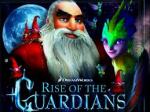 Last week my family watched Rise of the Guardians. The idea is that there are guardians on Earth who preserve important ideals: Santa Claus (wonder), the Easter Bunny (hope), the Sandman (dreams), and the Tooth Fairy (memory, stored in teeth). Then there’s Jack Frost, and nobody knows what he’s good for, including himself. (Spoiler: turns out he’s the guardian of fun). The whole world is being darkened by the Boogeyman, Pitch Black, who was responsible for the surfeit of fear during the Dark Ages, and is now sapping the world once again of wonder, hope, dreams, memory, and fun. Pitch and Jack have similar backgrounds: created by the Man in the Moon, they were then abandoned by him, and left with no feeling of purpose. Jack finds his purpose, allies with the guardians, and defeats the Boogeyman.
Last week my family watched Rise of the Guardians. The idea is that there are guardians on Earth who preserve important ideals: Santa Claus (wonder), the Easter Bunny (hope), the Sandman (dreams), and the Tooth Fairy (memory, stored in teeth). Then there’s Jack Frost, and nobody knows what he’s good for, including himself. (Spoiler: turns out he’s the guardian of fun). The whole world is being darkened by the Boogeyman, Pitch Black, who was responsible for the surfeit of fear during the Dark Ages, and is now sapping the world once again of wonder, hope, dreams, memory, and fun. Pitch and Jack have similar backgrounds: created by the Man in the Moon, they were then abandoned by him, and left with no feeling of purpose. Jack finds his purpose, allies with the guardians, and defeats the Boogeyman.
It’s a fun movie really. Obvious complaints can be made. (For one, it follows all American animated movies in making fun of foreign accents, and making all evil characters British.) But I must say that, in my neokantian enthusiasm, I found myself behind the project. Yes: we do need to safeguard wonder, hope, dreams, memory, and fun, and we must have the courage to defeat fear and pessimism, and create a future in which human virtues are preserved and elevated. We can and must work to make our future the United Federation of Planets, and not Brazil. I have this sacred hope. So I was rooting for the guardians all the way.
But at the end of the film I felt my eyes widen in shock and heard myself muttering, “No! No, no, no! They are getting it wrong!” You see, the guardians, aligned with the last remaining hopeful children on the planet, summon the power to banish the Boogeyman into a dark place from which he cannot escape until there is a sequel. But that’s wrong! Aeschylus, in the Oresteia, was working with the same plotline, and he saw his way clear to the right ending: the Furies must be transformed into the Eumenides, so that the fury of bloody revenge is transmuted into civic loyalty, and humanity attains a higher synthesis. The guardians could have and should have done the same – it would have taken only one of Jack Frost’s magical snowballs to conquer fear and transform Pitch Black into Stout Heart – that is, courage, something the guardians need to perform their function. The world then would have advanced into a newfound synthesis that left it stronger for having discovered and overcome its fear. And they still could have had a sequel, in which the guardians fight against a greedy Hollywood studio that wants to take all human virtues and sell them as merchandise.
What a deep disappointment!
Leave a comment